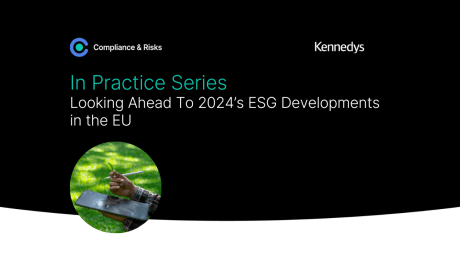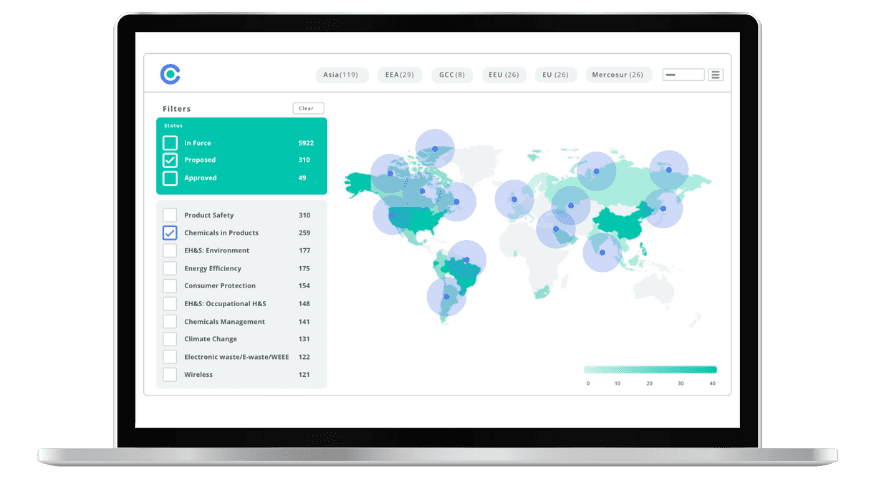
Building a Sustainable Future: A Guide to Key ISO Standards

This blog was originally posted on 14th May, 2024. Further regulatory developments may have occurred after publication. To keep up-to-date with the latest compliance news, sign up to our newsletter.
AUTHORED BY RÚAN DOHERTY, REGULATORY ANALYST, COMPLIANCE & RISKS
Introduction
In today’s rapidly changing world, sustainability has become a central focus for businesses, communities, and individuals alike. With increasing awareness of environmental and social issues, companies and organizations are seeking ways to integrate sustainability into their operations and practices.
Outlined below are some of the key ISO standards that can serve as valuable tools on the journey towards sustainability. From environmental management systems to sustainable procurement practices, each standard offers a framework for action and a pathway to progress.
Key ISO Standards
ISO standards are internationally recognized guidelines and specifications developed by the International Organization for Standardization (ISO) to ensure quality, safety, and efficiency across various global industries and sectors. These standards cover a diverse range of topics such as environmental sustainability, health and safety, energy efficiency, risk management and anti-bribery measures. Overall, they aim to standardize processes, products, and services, enabling companies and organizations to operate more efficiently, reduce risks, and enhance customer satisfaction.
ISO has developed several standards related to sustainability across various domains. Here’s a brief synopsis of some key ISO sustainability standards:
ISO 14001:2015 – Environmental Management Systems: This is a cornerstone standard for organizations looking to enhance their environmental performance. It provides guidelines for establishing, implementing, maintaining, and improving environmental management systems. It helps organizations proactively identify and manage their environmental impacts effectively. The benefits of implementing this standard include improved environmental performance, cost savings through resource efficiency, enhanced reputation, and stakeholder trust.
ISO 14064 – Greenhouse Gases: This is a series of standards designed to address greenhouse gas (GHG) accounting and verification, aiding organizations in quantifying, monitoring, reporting, and verifying their GHG emissions accurately. Divided into three parts, ISO 14064-1 focuses on entity-level GHG inventories, ISO 14064-2 on project-level emissions reductions, and ISO 14064-3 on verification processes. By providing standardized guidelines, the ISO 14064 series enables organizations to manage their carbon footprint effectively, contribute to climate action, and uphold credibility in GHG reporting.
ISO 20400:2017 – Sustainable Procurement: This standard offers principles, practices, and recommendations for organizations to integrate sustainability considerations into their procurement processes. It emphasizes the importance of considering environmental, social, and economic factors throughout the procurement lifecycle, from supplier selection to contract management and beyond.
ISO 26000:2010 – Guidance on Social Responsibility: This standard establishes a structure for organizations to integrate ethical behavior, sustainability, and accountability into their operations. ISO 26000 covers areas such as human rights, labor practices, environmental stewardship, fair operating practices, consumer issues, and community involvement. It encourages organizations to engage with stakeholders, transparently report their social impacts, and continuously improve their performance.
ISO 37001:2016 – Anti-Bribery Management Systems: Providing a framework to help organizations in preventing, detecting, and addressing bribery-related risks and issues, this standard outlines requirements for establishing policies, procedures, and controls. The aim of this standard is to promote an ethical business culture and ensure compliance with anti-bribery laws and regulations.
ISO 37301:2021 – Compliance Management Systems: This standard provides a roadmap for organizations to establish, implement, maintain, and continuously improve a compliance management system that is tailored to their specific needs and objectives. It outlines principles and practices for effectively managing ESG-related compliance risks, ensuring legal and regulatory compliance, and promoting an ethical business culture.
ISO 50001:2018 – Energy Management Systems: This standard assists organizations in establishing, implementing, maintaining, and improving an energy management system, with the ultimate goal of helping organizations of all sizes and sectors enhance energy efficiency, reduce energy costs, and minimize their environmental impact. It emphasizes a systematic approach to energy management, including setting energy objectives, implementing action plans, and monitoring performance to achieve continual improvement.
ISO/WD 53001 – Management Systems for UN Sustainable Development Goals – Requirements: While still in development, this draft standard aims to help organizations align their strategies, goals, and activities with the UN Sustainable Development Goals (SDGs) to support sustainable development. It emphasizes the importance of considering the environmental, social and economic dimensions of sustainability in decision-making and operations. Once finalized, ISO/WD 53001 will provide a valuable framework for organizations seeking to demonstrate their commitment to sustainability and contribute to the achievement of the SDGs on a global scale.
Conclusion
As environmental, social, and governance-related considerations become increasingly central to companies and organization’s practices, these standards can provide valuable frameworks for operating sustainably, reducing environmental footprints, enhancing social responsibility, and improving overall performance.
They are designed to be adaptable to various industries and organizational contexts, promoting a holistic approach to sustainability and offering a strategic investment in long-term success and resilience in an ever-evolving world.
References:
- ISO 14001:2015
- ISO 14064-1:2018
- ISO 14064-2:2019
- ISO 14064-3:2019
- ISO 20400:2017
- ISO 26000:2010
- ISO 37001:2016
- ISO 37301:2021
- ISO 50001:2018
- ISO/WD 53001
Stay Ahead Of Regulatory Changes in ISO Standards on Sustainability
Accelerate your ability to achieve, maintain & expand market access for all products in global markets with C2P – Your key to unlocking market access, trusted by more than 300 of the world’s leading brands.
C2P is an enterprise SaaS platform providing everything you need in one place to achieve your business objectives by proving compliance in over 195 countries.
C2P is purpose-built to be tailored to your specific needs with comprehensive capabilities that enable enterprise-wide management of regulations, standards, requirements and evidence.
Add-on packages help accelerate market access through use-case-specific solutions, global regulatory content, a global team of subject matter experts and professional services.
- Accelerate time-to-market for products
- Reduce non-compliance risks that impact your ability to meet business goals and cause reputational damage
- Enable business continuity by digitizing your compliance process and building corporate memory
- Improve efficiency and enable your team to focus on business critical initiatives rather than manual tasks
- Save time with access to Compliance & Risks’ extensive Knowledge Partner network

ESG 2023: A Year in Review
Our whitepaper summarizes the ESG regulatory landscape in 2023, reviewing the key regulations proposed, published and/or entered into force.


